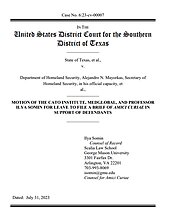Learn more about Cato’s Amicus Briefs Program.
In January, the Biden Administration adapted the approach used by the successful Uniting for Ukraine private migrant sponsorship program to include a combined total of up to 30,000 migrants per month from four Latin American countries: Cuba, Nicaragua, Venezuela, and Haiti (the CNVH countries). Under these programs, migrants fleeing war, oppression, poverty, and violence in these countries can quickly gain legal entry into the United States and the right to live and work here for up to two years, if they have a private sponsor in the US who commits to supporting them.
Twenty GOP-controlled states filed a lawsuit challenging the legality of the program for the four Latin American nations (though not Uniting for Ukraine). They claim the program lacks proper congressional authorization. Ironically, the flaws in the lawsuit are highlighted by the plaintiff state governors’ own statements about the evils of socialism and the urgent need to address the crisis at the southern border.
The Cato Institute has filed an amicus brief defending the program, together with MedGlobal, and Professor Ilya Somin (who is also the author of the brief). MedGlobal is a charitable non-governmental organization. Its health programs support victims of wars and disasters, internally displaced persons, and refugees, including many from the CNVH countries. Ilya Somin is a law professor at George Mason University, and B. Kenneth Simon Chair in Constitutional Studies at Cato; he writes extensively about migration law and policy, and is a sponsor in the Uniting for Ukraine program.
The CNVH program is authorized by the Immigration and Nationality Act which states that “[t]he Attorney General may, except as provided in subparagraph (B) or in section 1184(f) of this title, in his discretion parole into the United States temporarily under such conditions as he may prescribe only on a case-by-case basis for urgent humanitarian reasons or significant public benefit any alien applying for admission to the United States.” 8 U.S.C. § 1182(d)(5)(A).
Part I of the brief demonstrated that migrants from the CNVH countries indeed have “urgent humanitarian reasons” to seek refuge in the United States. They are fleeing a combination of rampant violence, brutal oppression by authoritarian socialist regimes, and severe economic crises. So great is the humanitarian need here, that even the leaders of some of the plaintiff states have recognized and denounced the horrific conditions in these countries.
In Part II, we show that paroling CNVH migrants also creates a major “public benefit.” That benefit is reducing pressure and disorder on America’s southern border. Here, too, some of the Plaintiff states have themselves recognized the importance of this benefit, and indeed have loudly called for measures to achieve it. The CNVH program has already massively reduced cross-border undocumented migration by citizens of the four nations it covers.
Part III explains why the parole program is consistent with the statutory requirement that parole be conducted on a “case by case basis.” 8 U.S.C. § 1182(d)(5)(A). The Plaintiffs’ position on this point is inconsistent with statutory text, Supreme Court precedent, and basic principles of statutory interpretation. It would also lead to absurd results.
Finally, Part IV shows that, while the Plaintiffs have limited their lawsuit to challenging the CNVH program, if the court accepts their position it would also imperil Uniting for Ukraine. The latter relies on the same legal authority as the former.
In sum, this ill-conceived lawsuit deserves to fail for reasons well-articulated by leaders of some of the very same states that filed it.

This work is licensed under a Creative Commons Attribution-NonCommercial-ShareAlike 4.0 International License.

